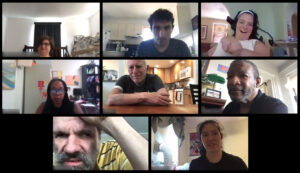In honor of Black History Month, we wanted to spotlight WAE to Connect’s “Let’s Talk About Us” class, where the work of understanding social justice issues is underway.
Class facilitator Randy Harris says, “We approach the class as a journey and as a group we decided on some ‘Rules of the Road.’ These rules include respect, keeping an open mind, listening, and refraining from yelling or talking over each other.”
 Each virtual class session includes the study of history, politics, sociology, and more. The class covers topics such as the Covid-19 pandemic, racism, civil unrest, police brutality, and economic instability. Music and poetry are used with intention in the class, as it often speaks when words fail us. The “Playlist” for this series of classes: comforts us with “Take Me to the Alley”, wakes us to “1960 What?”, breaks our hearts because “We Can’t Breathe”, emboldens us to speak “Truth to Power”, alerts us to “Ball of Confusion”, sickens us on ” “Strange Fruit” and lets us know “A Change Gone Come.”
Each virtual class session includes the study of history, politics, sociology, and more. The class covers topics such as the Covid-19 pandemic, racism, civil unrest, police brutality, and economic instability. Music and poetry are used with intention in the class, as it often speaks when words fail us. The “Playlist” for this series of classes: comforts us with “Take Me to the Alley”, wakes us to “1960 What?”, breaks our hearts because “We Can’t Breathe”, emboldens us to speak “Truth to Power”, alerts us to “Ball of Confusion”, sickens us on ” “Strange Fruit” and lets us know “A Change Gone Come.”
“Let’s Talk About Us” discussions are ripe with thoughts, concerns, and the questions that often accompany the process of looking at life through a new lens. Harris shares these snapshots from class discussions about American Black Experience and racism:
Jane Elliott’s Blue Eyes, Brown Eyes Experiment. The class learned about Mrs. Jane Elliot’s classroom where she conducted an experiment with her all-white third grade class in 1968. We witnessed just how quickly people could turn on one another. We saw that people aren’t born with prejudice, but learn the behavior. Mrs. Elliot said, “If it can be learned, it can be unlearned.” This study is still relevant in the world today.
Black woman takes down Confederate flag. Another class focused on Ms. Bree Newsome Bass, who took down the South Carolina Confederate flag. Group discussion explored the impact of symbols of racism, hatred, and oppression. We also examined how other countries addressed such symbols.
Driving While Black (DWB). “Let’s Talk About Us” listened to testimony of African Americans who shared their stories and fears of being stopped by police under the pretext of a minor infraction and how it could escalate into injury or death. Fearful testimonies ranged from average citizens and college students, to movie personalities like Lavar Burton. Some compared it to being in a state of war.
Active participants in the journey
“Our destination is fluid as Black history is American history. There will be bumps in the road and detours. But we are not sightseers. We will not merely check off boxes. We will get out and ask questions and probe. We will acknowledge fellow travelers and note intersections,” says Harris.
He continues, “I am hopeful, as I have seen comedic deflection turn into earnest reflection. If thoughts are energy, then let a trickle of consciousness lead to a current that swells into a wave of change. Moving toward a more equitable America is worth it. Meanwhile, we will, ‘Keep On Pushin’.”
A structured, safe forum for discussion
Harris provides a structured forum in which class members can discuss topics and events. The class offers:
- A safe place to voice opinions
- The vocabulary which allows members to understand and discuss these topics
- Opportunities for members to share experiences and identify their own values
- Space to self-reflect on how new knowledge intersects with long-held beliefs
- A forum for open minded discussion, exploration, and the opportunity for participants to raise consciousness of social justice and political issues
For more information about WAE to Connect and our online course offerings, visit waetoconnect.org.
Supported by a generous grant from the Healthcare Foundation of NJ

